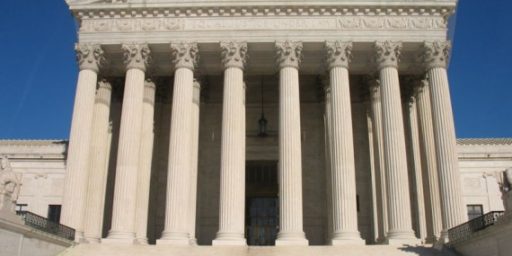Federal Judge Holds ACA’s Individual Mandate Unconstitutional

Another Federal Judge has held the Affordable Care Act’s individual mandate unconstitutional:
President Obama’s plan to require individual Americans to purchase health insurance or pay a penalty exceeds the powers granted both the president and Congress by the Constitution, a federal district court judge ruled Tuesday in Harrisburg
Federal District Judge Christopher C. Connor said the federal government’s power to regulate interstate commerce does not give it the power to compel individual citizens to purchase products against their will.
“The nation undoubtably faces a health-care crisis,” Conner said. “Scores of individuals are uninsured and the costs to all citizens are measurable and significant.
“The federal government, however, is one of limited enumerated powers,” Conner continued, “and Congress’ efforts to remedy the ailing health care and health insurance markets must fit squarely within the boundaries of those powers.”
The lawsuit was brought by a married couple in York County who sued Health and Human Services Secretary Kathleen Sebelius, who is overseeing the health-care plan, to overturn the law. The couple, Barbara Goudy-Bachman and her husband, Gregory Bachman, said they had dropped their own health coverage because it exceeded the cost of their mortgage payments.
They said they preferred to pay for their health care out of pocket.
However, Conner rejected an argument by the couple that the mandate is “disastrous to this nation’s future, such as the Bachmans’ prediction of America evolving into a socialist state. These suggestions of cataclysmic results … are both unproductive and unpersuasive.”
While most of the massive law can remain intact, Conner said, certain provisions are linked to the health insurance requirement and must also be struck down. Those provisions are designed to guarantee that insurance companies cannot discriminate against or deny coverage to the sick or people with pre-existing conditions.
In this opinion, Judge Connor explicitly rejected the arguments made by other Judges who have upheld the mandate as a proper exercise of the Court’s Commerce Clause power:
Wickard and Raich, the Supreme Court’s most expansive interpretations of the Commerce Clause, do not extend Commerce Clause jurisprudence to the realm Congress seeks to regulate with the minimum coverage provision. Judge Sutton’s conclusion in Thomas More Law Center, that the plaintiffs in Wickard and Raich were regulated prior to their entry in the relevant markets, ignores the affirmative conduct of those plaintiffs in obtaining or producing commodities with an interstate market. Importantly, the respondents in Raich could stop cultivating and possessing marijuana and thus places themselves beyond the scope of the Controlled Substance Act. Roscoe Filburn, the farmer in Wickard, could avoid penalty by simply choosing to grow less wheat, or none at all. Congress can reach the personal production of wheat—a clear activity affecting the interstate market—in an effort to stabilize the wheat market. Congress cannot, however, in order to stabilize that market, force the purchase of wheat by individuals who decide to forego wheat or wheat products, even if Congress legitimately determines that an individual’s decision to not purchase wheat or wheat products inhibits the government’s ability to regulate or stabilize the wheat market. Similarly, Congress may lawfully regulate the interstate market for health insurance and health services, but Congress cannot require individuals who choose not to purchase health insurance or individuals who are not currently seeking or receiving services in the health care market to purchase health insurance in order to stabilize the health insurance market. Congress cannot mandate or regulate in anticipation of
conduct that may or may not occur in the future.(…)
Before an uninsured, or self-insured individual’s conduct has any effect on commerce, the individual must first obtain health care services. Indeed, the actual conduct targeted by Congress requires yet a further step—nonpayment of services. See Thomas More Law Ctr., — F.3d at —, 2011 WL 2556039, at *38 (Graham, J., dissenting) (noting that the minimum coverage provision is not conditioned on either the consumption of health care services or the nonpayment for those services). Unless and until that point, an individual’s status as uninsured or “self insured”—whichever nomenclature one chooses to apply—has no effect whatsoever on interstate commerce. Concisely stated, “the mere status of being without health insurance, in and of itself, has absolutely no impact whatsoever on interstate commerce (not ‘slight,’ ‘trivial,’ or ‘indirect,’ but no impact whatsoever)-at least not any more so than the status of being without any particular good or service.” Florida, — F. Supp. 2d at —, 2011 WL 285683, at *26. The minimum coverage -provision regulates now for a future contingent event. It is a mandate anticipation of the receipt of health care services that forces individuals to become market participants prior to entering the market or engaging in any conduct, activity or transaction in that market.
As noted, though, Connor rejected the doomsday arguments that some have made that allowing the individual mandate to tand would mean that the Federal Government could mandate any activity:
The consequences of an expanded commerce power are not so dire. First, the notion that Congress could compel the consumption of broccoli, see Florida, — F. Supp. 2d at —, 2011 WL 285683, at *24 (“Congress could require that people buy and consume broccoli at regular intervals . . . .”), or apples, for that matter, is simply incorrect. See, e.g., Planned Parenthood of S.E. Pa. v. Casey, 505 U.S. 833, 849 (1992) (“[T]he Constitution places limits on a State’s right to interfere with a person’s most basic decisions about family and parenthood, as well as bodily integrity.” (internal citations omitted)); Cruzan v. Mo. Dep’t of Health, 497 U.S. 261, 278 (1990) (individuals possess constitutionally protected liberty interest in refusing unwanted medical treatment); Washington v. Harper, 494 U.S. 210, 229 (1990) (“The forcible injection of medication into a nonconsenting person’s body represents a substantial interference with that person’s liberty.”). To be sure, it is the government’s view that the Commerce Clause power subsumes the power to compel a purchase or a transaction, not consumption. (Tr. at 49-54). Second, as the dissent in Florida astutely observes, Congress is restricted by constitutional text and Supreme Court jurisprudence to the regulation of economic behavior that has a substantial affect on interstate commerce. Florida, — F.3d at —, 2011 WL 3519178, at *105 (Marcus, J., dissenting); see also id. at *99-102. These are, indeed, “powerful limits” upon the exercise of Congress’s Commerce Clause power. Third, the truly unique factual circumstances of this case would necessarily render any holding limited. Id. at *109; id. at * 112 (“Upholding the mandate under the particular circumstances of this case would do little to pave the way for future congressional mandates that address wholly distinct problems that may arise in powerfully different contexts.”). Finally, an informed electorate would not countenance frivolous mandates. See Daughters of Miriam Ctr. for the Aged v. Mathews, 590 F.2d 1250, 1257 (3d Cir. 1978) (stating that “for protection against abuses by legislatures the people must resort to the polls” (internal citations and quotations omitted)); see also United States v. Butler, 297 U.S. 1, 79 (1936) (Stone, J., dissenting) (“For the removal of unwise laws from the statute books appeal lies, not to the courts, but to the ballot and to the processes of democratic government.”).
This case is going to be mired in the appeals process for some time so it’s unlikely to be among those that the Supreme Court rules on in the upcoming term. Nonetheless, Judge Connor’s decision wil be another argument that opponents of the mandate will cite in their favor. How persuasive it is in the end remains to be seen.
Here’s the opinion:






Your link to the article on Philly.com is broken, Doug. Try this one.
A Bush 43 appointee who is reputed to be a judge that shoppers go shopping for when they are shopping for judges. I’ll take this one with a grain of salt. See you at the Supremes.
Send this to SCOTUs and be done with the damn plan once and for all.
You shouldn’t be forced to pay for insurance if you can opt out of the activity requiring insurance. Opt out of driving a motor vehicle – don’t buy auto insurance. Opt out of home ownership – don’t buy hazard insurance.
But you can’t opt out of health. If you’re alive, then you have some level of health and you need to insure it. Once you die, you can stop buying health insurance!
Correct me if I am mistaken here, but is it not the position of most Republicans, and also libertarians (including Doug, I do believe), that individuals should be required to set up private accounts into which a portion of their Social Security taxes would go – to then be invested in the private market?
Note – the standard GOP program is not to simply cut SS taxes and encourage people to save that money for their own retirement – it is rather a mandated program – these dollars must go into retirement accounts. Is that not the case?
And does that no equally represent a mandate from the federal government to purchase a private good or service – in this case an investment portfolio on the private markets?
@jd: That’s precisely why you should NOT be forced to buy health insurance. You can choose not to drive and thus avoid mandated auto insurance (and many do esp in places like Chicago and NYC). You can chose not to own a home and thus avoid Home Owner’s insurance.
You can’t choose not to have a body. That means you can not avoid big brother telling you how to spend your money on a private commodity and that’s wrong.
Honestly we as a society have to make up our minds:
Do we think that Health Care is an absolute natural right or don’t we.
If we DO think it’s an absolute right, then health care should be entirely govt run (like our secondary school system is) with perhaps a more expensive private option. [I disagree with this opinion btw, but it is the logical conclusion if we think healthcare really is a right.]
If we DON’T think it’s an absolute right, then govt needs to get out of the healthcare business entirely because it is warping the healthcare costs.
This “middle of the road” fecal matter is hurting everyone.
-Polaris